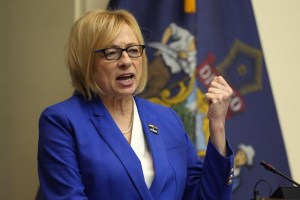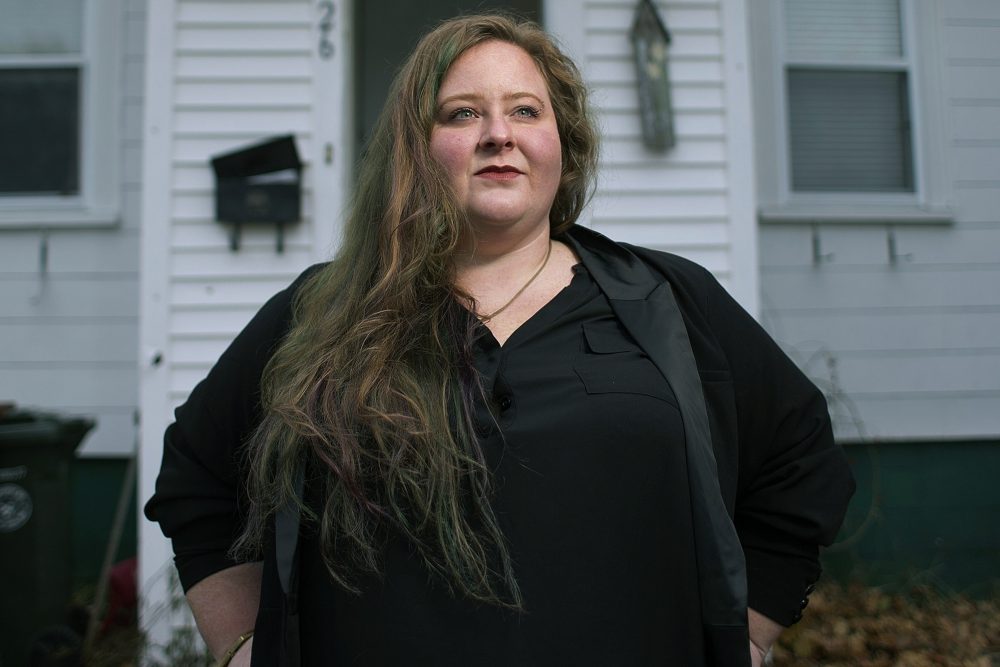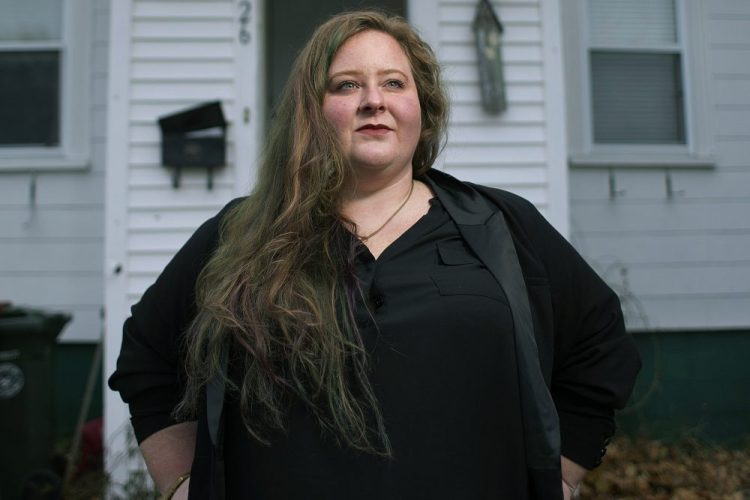Bre Danvers-Kidman said the fight for transgender rights and equality was always going to be a challenge.
Many worry the battle will become more difficult under President-elect Donald Trump – who spoke disparagingly and often falsely about transgender individuals during his campaign and spent millions on anti-trans advertisements.
“Politics runs on the economics of fear,” said Danvers-Kidman, executive director of MaineTransNet, a statewide advocacy organization. “Trans people aren’t well understood by a large section of the population, and that makes us a prime target.”
Gia Drew, executive director of EqualityMaine, the state’s largest LGBTQ+ organization, sees Trump’s election as an “inflection point” that could lead to a “very challenging time for many who are part of marginalized communities.”


Gia Drew, a transgender woman in her 50s, who came out when she was a teacher and track coach at Kennebunk, is the program director of EqualityMaine. Gregory Rec/Staff Photographer
“I am concerned that people are just going to give up – give up on being true to themselves and hide who they are from their family, friends and co-workers,” Drew said. “I’m especially concerned for the wellbeing of trans and non-binary folks, who were singled out by the next president. I’m worried for young people who hear these horrible messages and internalize them. I’m anxious that some might consider drastic measures. My message is that we’re here and nothing about the election changes who you are.”
A recent survey showed that there are nearly 6,000 adults and 1,200 children who are transgender in Maine. Many face high rates of discrimination and verbal, physical and sexual attacks.
In many ways, transgender rights have supplanted gay rights as the social issue wedge for Republicans, and Trump has seized it with both hands. During the campaign he repeatedly claimed, without evidence, that children have been subjected to gender reassignment surgeries at public schools and that doctors are providing gender-affirming care as a way to make money.
In a video posted on his social media accounts after the election, Trump said: “The left-wing gender insanity being pushed on our children is an act of child abuse, very simple.”
“Here’s my plan to stop the chemical, physical and emotional mutilation of our youth. On day one, I will revoke Joe Biden’s cruel policies on so-called gender affirming care. Ridiculous. I will sign a new executive order instructing every federal agency to cease all programs that promote the concept of sex and gender transition at any age. I will then ask Congress to permanently stop federal taxpayer dollars from being used to promote or pay for these procedures and pass a law prohibiting child sexual mutilation in all 50 states. It’ll go very quickly.”
Trump’s characterization of gender-affirming care as mutilation is incendiary and misleading. In most cases, gender-affirming care involves counseling and hormone therapy. Reassignment surgery is rare, especially among children, and only happens after a diagnosis of gender dysphoria and under restrictions set by medical providers.
Danvers-Kidman said the focus by Trump and Republicans on surgery reflects how little they understand about transgender individuals.
“So much of this is rooted in poor understanding of how gender-affirming care actually works,” they said. “They think people wake up one day and get surgery to change gender. That’s not how it works. Intervention is gradual and takes informed consent. Providers are not champing at the bit to give people transformative surgeries.”
GOV. MILLS: ‘GET RID OF BUZZWORDS’
Attacking trans rights is part of a broader conservative pushback against so-called woke ideology, which doesn’t really have a definition but often refers to efforts to protect and lift up groups that have historically been marginalized.
But as Democrats reel from surprising Election Day defeats – not just at the presidential level but in Congress, too – some have wondered if leaning too hard into identity politics has hurt them. The ubiquitous anti-trans ad from the Trump campaign, which ended with a voiceover saying: “Kamala is for they/them. Trump is for you” – a reference to pronouns often used by transgender and nonbinary individuals – was seen as effective, even by some Democrats.
U.S. Rep. Seth Moulton of Massachusetts, a Democrat, told the New York Times in a post-election interview that “Democrats spend way too much time trying not to offend anyone rather than being brutally honest about the challenges many Americans face.”
He also addressed trans rights – specifically whether transgender men should be allowed to compete in women’s athletic competitions.
“I have two little girls. I don’t want them getting run over on a playing field by a male or formerly male athlete,” Moulton told the Times. “But as a Democrat, I’m supposed to be afraid to say that.”


Gov. Janet Mills delivers her State of the State address on Jan. 30, at the State House in Augusta. Robert F. Bukaty/Associated Press, file
Maine Gov. Janet Mills, also a Democrat, also mused about her party’s focus on identity politics in an interview this week with Politico columnist Jonathan Martin.
“We’ve got to talk about pocketbook issues and get over the identity politics – that’s in the past, I think – and get rid of the buzzwords,” she said.
Mills said Democrats are portrayed as being for “transgender this and that, every multicultural person,” which creates the perception that they are “forgetting a whole bunch of other people who don’t view themselves falling into that pigeonhole.”
Mills has so far refused interview requests by the Press Herald since the election, but a written statement provided by her office last week took a very different tone.
In response to questions about whether the governor is concerned Trump might try to erode trans rights in states like Maine that have progressive policies, her spokesman Ben Goodman highlighted several actions her administration has taken to strengthen protections for transgender people in Maine, including allowing gender-affirming care under MaineCare, signing the shield law to protect providers, and amending the Maine Insurance Code to prohibit discrimination against transgender people in health coverage plans regulated by the Maine Bureau of Insurance.
Asked to clarify the governor’s remarks to Politico, Goodman said Mills was trying to say that “she would like to see the party broaden its reach and speak to the commonalities that we all share – the desire to live safely and freely, to get a good education, to have access to affordable health care, to have a meaningful, good-paying job, and to be able to afford housing and basic necessities, among other concerns that we all share. She believes we can do that while fully protecting the freedoms and rights of all Maine people.”
‘ALL PEOPLE HEAR IS THIS HEIGHTENED RHETORIC’
Like same-sex marriage, the matter of transgender rights ultimately could be settled by the Supreme Court.
The Biden administration, in response to the growing number of states that established bans on gender-affirming care, appealed to the court this year. The case in question involves a law in Tennessee that restricts puberty blockers and hormone therapy for transgender minors and could be decided by next year.
Maine is on the other end of the spectrum when it comes to trans rights.
State health care providers not only offer gender affirming care, it’s also covered by MaineCare. Additionally, lawmakers passed a bill in 2023 that allows 16 and 17-year-olds to access care (excluding surgery) with their parents’ permission. Another law passed and signed this year protects practitioners who are providing legally protected health care in the state from hostile litigation from out of state.
This spring, the Maine Principals’ Association approved a policy that allows transgender athletes to compete on teams either according to their birth-assigned gender or gender identity.
Maine also was at the early forefront of transgender rights.
A decade ago, Nicole Maines, then a middle school student in Orono, won a case before the Maine Supreme Judicial Court, which ruled that school administrators violated her civil rights when they made her use a staff bathroom at her elementary school instead of the girls’ restroom. It was the first time a state supreme court affirmed a transgender person’s right to equal access to restrooms in places of public accommodation. Now, unisex or single-occupancy bathrooms are commonplace in schools and workplaces in Maine and elsewhere.
Danvers-Kidman said there was hope following the nationwide legalization of same-sex marriage that transgender rights might soon follow. But that hasn’t happened, in part because of how people get information.
“There just isn’t a lot of unbiased news out there right now, so all people hear is this heightened rhetoric,” they said.
Some of the worst rhetoric focuses not just on restricting care but trying to remove trans people from public life.
“That’s not possible. You aren’t going to erase us. We exist,” they said.
Drew said EqualityMaine is “committed more than ever to resisting oppression and hate.”
“We will continue to make Maine a safe and welcoming state for all LGBTQ+ people,” she said. “Yes, the rights and freedoms of LGBTQ+ Americans are going to be challenged under another Trump administration, but our community knows that resilience is our superpower.
At a post-election meeting of more than 100 trans individuals and supporters days after the election, Danvers-Kidman said the mood was understandably downcast.
But people were motivated, too.
“This is not what we wanted to be doing,” they said. “But I think it was sort of a ‘let’s roll up our sleeves’ moment.”
(Except for the headline, this story has not been edited by PostX News and is published from a syndicated feed.)


